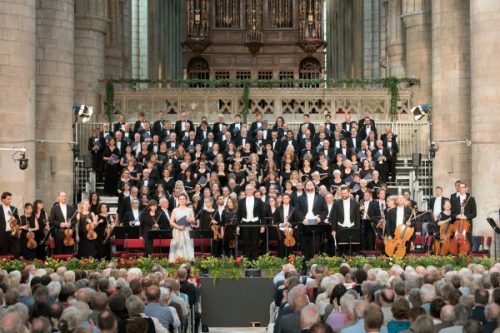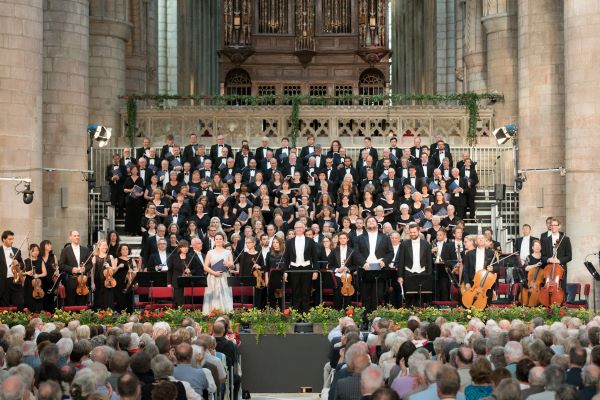
 United Kingdom Three Choirs Festival [8] – Handel/Mendelssohn: Susanna Fairbairn (soprano), Rebecca Afonwy Jones (mezzo-soprano), Jess Dandy (contralto), Stuart Jackson (tenor), James Newby (bass), Three Choirs Festival Chorus, Philharmonia Orchestra / Geraint Bowen (conductor). Gloucester Cathedral, 31.7.2019. (JQ)
United Kingdom Three Choirs Festival [8] – Handel/Mendelssohn: Susanna Fairbairn (soprano), Rebecca Afonwy Jones (mezzo-soprano), Jess Dandy (contralto), Stuart Jackson (tenor), James Newby (bass), Three Choirs Festival Chorus, Philharmonia Orchestra / Geraint Bowen (conductor). Gloucester Cathedral, 31.7.2019. (JQ)

Handel (arr. Mendelssohn) – Israel in Ägypten (Israel in Egypt)
As luck would have it, only a matter of weeks ago I attended a fine performance of Israel in Egypt in Chipping Campden (review) That performance and the one I heard this evening were as different as chalk from cheese. The Chipping Campden performance presented Handel’s score with a small professional choir and a period instrument orchestra. We experienced something very different but also very intriguing.
Over the years Handel oratorios, and Messiah in particular, were staples of the repertoire at Three Choirs Festivals. However, they’re not heard at the Festival as frequently nowadays. Partly that’s because there’s so much more music clamouring for attention and only a few days of concerts. Just as importantly, though, I suspect that Adrian Partington and his colleagues at Hereford and Worcester have been understandably wary of staging Handel oratorios with a large chorus and orchestra now that we’re so used to historically informed performances of these works by small, flexible choirs and modest orchestral forces. Insofar as Handel’s choral music has featured in recent Festival programmes, therefore, it’s tended to be performed either by small specialist ensembles or by the Three Cathedral Choirs with period instruments. owever, an intriguing and novel compromise was found when Geraint Bowen conducted the UK concert premiere of Mendelssohn’s arrangement of Israel in Egypt.
Actually, I should more properly refer to the work as Israel in Ägypten because the work was sung in German. However, for ease of reference I propose to use the English titles of individual movements, as necessary, since that’s the way in which they’ll be more familiar to most readers. Although Mendelssohn’s arrangement has not previously been performed in the UK I have heard it because there have been, I think, two recordings: the one I’ve heard is the excellent recording by Robert King (review) and in fact, I believe it was King’s edition of the score that was used tonight.
Some background is necessary. Mendelssohn’s version, was created for a performance that he conducted in Dusseldorf in 1833 and he went on to give further performances over the next few years. For pragmatic reasons Mendelssohn made changes to Handel’s score: for example, he used cellos and a double bass for the recitatives because the hall where the performance was to be given lacked an organ. And to support the very large chorus he added trombones and wind instruments to the orchestra. I couldn’t see the orchestra clearly from my seat but it sounded to me as if a pair of each woodwind instruments was used, as on the King recording. Mendelssohn cut a handful of choruses. He also added in quite a few recitatives, chiefly for the tenor soloist and mainly in Part I, ‘Exodus’. Some of the most notable changes concerned the solo arias. One or two of these were reassigned to different voices – ‘Their land brought forth frogs’ was sung by the bass rather than by an alto; ‘The enemy said, I will pursue’ became a soprano aria, rather than a tenor solo – and one of the most celebrated arias, ‘The Lord is a man of war’ for two basses disappeared altogether. Some arias were imported from other Handel works, including a duet for alto and bass, which I believe was extracted from one of the Chandos anthems. One other alteration was that the oratorio was preceded by an original overture composed by Mendelssohn himself.
My understanding is that these changes, including the changes to the scoring, were made by Mendelssohn for purely pragmatic reasons connected with the circumstances of the performances he conducted: he had no ambition to ‘improve’ Handel’s original work, for which he had deep respect. Some of this could – and should – have been explained in the programme notes but this was not done. The note consisted of an essay by R Larry Todd, an American professor who is a Mendelssohn expert, I believe. Professor Todd went into great detail – more than was needed – about how Mendelssohn came to admire and proselytise on behalf of Handel’s music, but he was almost entirely silent on the changes which people who were familiar with Handel’s original would experience in this performance. So far as I could tell, Prof Todd’s note was a reprint of an essay he wrote to accompany the Robert King recording but on that occasion his essay was supplemented by another one, by King himself, discussing the musical changes. I mention this because in the interval I overheard one or two snippets of conversation among the audience, some of whom were confused by the changes and clearly believed that Geraint Bowen – not Mendelssohn – had made cuts (a word I heard more than once) in Handel’s score.
There was much to admire in the performance, though it raised one or two questions as well. The Overture was genuine Mendelssohn; in other words, not based on Handel’s music. So far as I know, it was composed specially. Geraint Bowen and the Philharmonia gave it a vigorous performance, though I think it’s rather too long. Mendelssohn’s orchestration undoubtedly adds extra colours and he did his work with taste. I was interested to find, though, that one effect of the re-scoring is that, tonight at least, at the big moments the trumpets didn’t stand out as much as they do in Handel’s original version and that’s a pity. My previous encounter with the version had been on CD and in a performance that uses period instruments, so that’s probably why this point hadn’t struck me before.
The male soloists were good. The tenor sings many of the recitatives – accompanied not by a harpsichord but by two cellos and a double bass. Stuart Jackson made a very positive impression, singing with clarity and presence. Bass James Newby also did well. His isn’t the biggest bass voice I’ve heard but he sang firmly and his voice was always well focussed. He sang the agile aria ‘Their land brought forth frogs’ very well. The ladies were less consistent. In Part I we only heard soprano Susanna Fairbairn. I was disappointed. She seemed to me to try far too hard, possibly seeking to project out into the cathedral nave. As a result, her sound didn’t fall pleasingly on the ear and many top notes did not seem to be securely hit. In Part II, ‘Moses’ Song’, she had the aria ‘The enemy said’. I don’t really feel that this music is well suited to the soprano voice anyway, but Miss Fairbairn gave a squally account of it which I did not enjoy. We heard the other two ladies only in Part II. Mezzo Rebecca Afonwy Jones, who sang the soprano II part, was much more to my taste. She hit all the notes truly and sang with good expression. I had mixed feelings about Jess Dandy. It’s good to hear a genuine contralto voice but first impressions were not auspicious. She partners the bass in a duet, ‘The heavens are thine’. Though Miss Dandy is a contralto she seemed to find the lower-lying part of the piece uncomfortably low. I don’t think her cause was helped much by the orchestration, though, which is dominated by bassoons and lower strings. Whatever the reason, her voice was often nearly inaudible, even from my seat not too far from the platform. In any event, the music itself isn’t desperately memorable. Happily, matters improved with Miss Dandy’s second appearance when she sang the heavenly aria ’Thou shalt bring them in’. She made a very good job of this; I liked her warm, generous tone.
Even with Mendelssohn’s cuts and insertions of additional solo items, Israel in Ägypten remains a work in which the lion’s share of the music – including most of the musical plums – is entrusted to the choir. The Festival Chorus did very well. There were times, when Handel’s music is fast and contrapuntal, when the lower textures became a bit muddy; that’s the main drawback to performing Handel with a large choir in a big acoustic. However, there could be no argument that a thrilling sound was often produced – I think, for example, of the last three choruses in the work, and the spectacular chorus near the start of Part II, ‘I will sing unto the Lord’, which was genuinely exciting. There was also good dynamic control: ‘The people shall hear’, one of the finest choruses in the work, was dramatically delivered, the drama heightened by excellent dynamic contrasts. Earlier, ‘He sent a thick darkness’ benefited from hushed suspense in the singing and, indeed, all the various plagues visited upon the poor Egyptians were vividly portrayed.
Geraint Bowen conducted the performance capably with his usual clarity and ear for detail. Perhaps one or two choruses were taken a bit swiftly given the size of the chorus, but if clarity was sacrificed on those occasions at least the drama was well served.
Handel’s Israel in Egypt is a great work. It’s probably of the most exciting choral works I know from the pre-Berlioz period. About Israel in Ägypten I’m less sure. That’s not in any way to disparage Mendelssohn’s efforts on Handel’s behalf. In an age when music was not as easily disseminated as is now the case, he made sterling efforts on Handel’s behalf, as he also did for Bach. And the decisions he took regarding scoring and the shape of the work were done for purely pragmatic reasons, related to the forces that he had at his disposal. That said, his version, while worthy of respect, is nowadays something of a curiosity. It was valuable to hear it and the Three Choirs Festival is to be congratulated for enterprise. However, tonight we heard Handel clothed in very luxurious raiment and my preference for lean, agile performances of this composer’s music remains unshaken.
John Quinn
